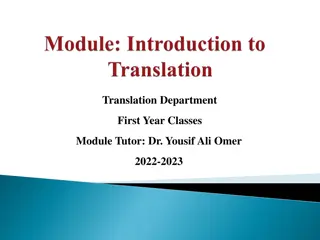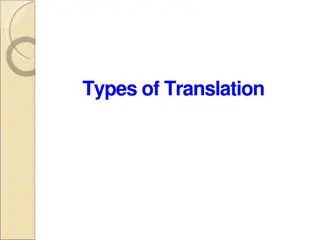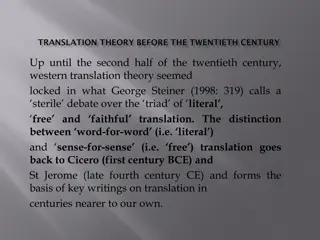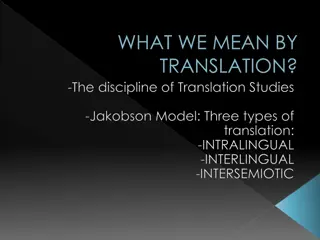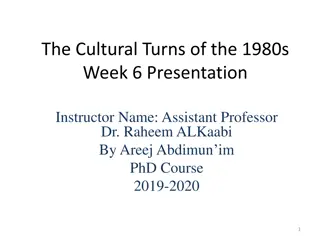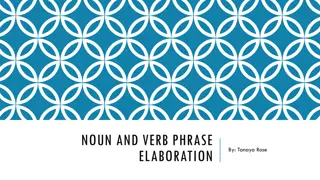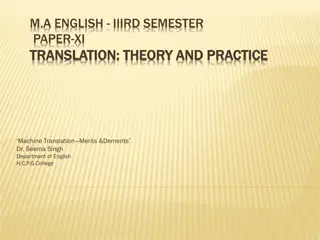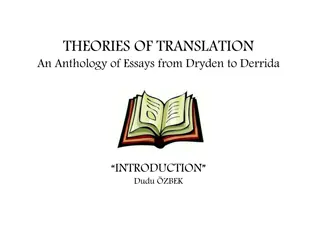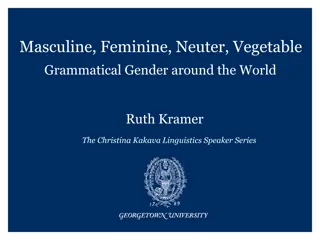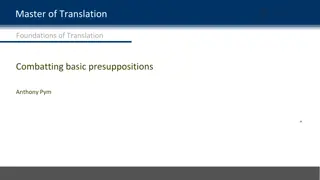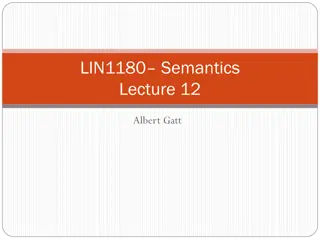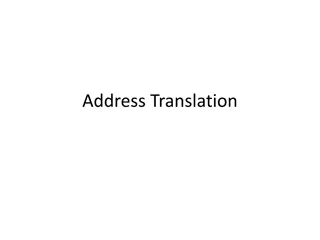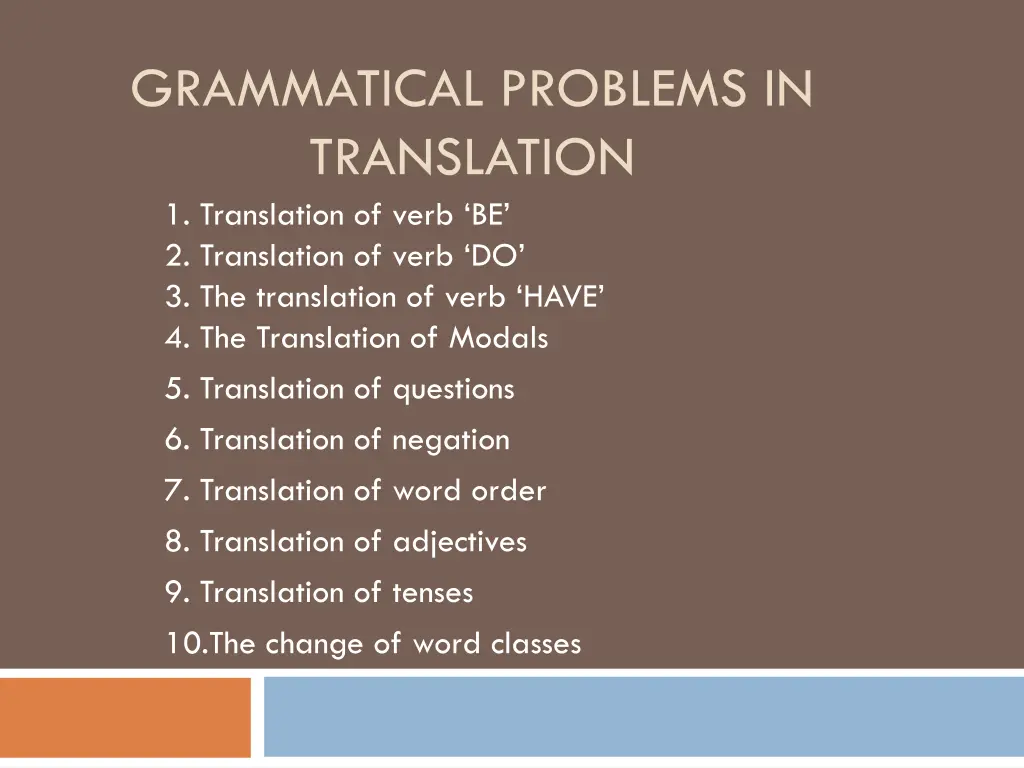
Common Grammatical Challenges in Translation
Explore common translation issues such as the translation of verbs like "be," "do," and "have," handling modals, questions, negation, word order, adjectives, tenses, and word class changes to enhance translation accuracy and effectiveness.
Download Presentation

Please find below an Image/Link to download the presentation.
The content on the website is provided AS IS for your information and personal use only. It may not be sold, licensed, or shared on other websites without obtaining consent from the author. If you encounter any issues during the download, it is possible that the publisher has removed the file from their server.
You are allowed to download the files provided on this website for personal or commercial use, subject to the condition that they are used lawfully. All files are the property of their respective owners.
The content on the website is provided AS IS for your information and personal use only. It may not be sold, licensed, or shared on other websites without obtaining consent from the author.
E N D
Presentation Transcript
GRAMMATICAL PROBLEMS IN TRANSLATION 1. Translation of verb BE 2. Translation of verb DO 3. The translation of verb HAVE 4. The Translation of Modals 5. Translation of questions 6. Translation of negation 7. Translation of word order 8. Translation of adjectives 9. Translation of tenses 10.The change of word classes
1. Translation of verb BE (am , is , are / was , were / be , been ) am, is, are (present) I am a student. X He is eating an apple. X They are put in the same situation. . X It is mostly unacceptable and poor in Arabic grammar to translate the present verb be into
Was, were . The child was ill. our guests were praying. But: The food was eaten. The boys were dismissed. . . X . X The past simple of be are translated literally into Yet literal translation is unfavorable when these verbs are used as auxiliaries to form the past passive voice.
been X Where have you been? be . He will be with us. - The dictionary meaning of been as is strictly not advisable to use. - The full form of the verb be is always literally translated.
2. Translation of verb DO (do, does, did) Do and did in the negative . . . That girl doesn t comb her hair. The horse does not fall down. The horse did not fall down. Do and did in the question Do you sleep early? Did Ali wait for you last night?
Do as a main verb . . I will do my best. Some students do their homework quickly. / At translating verb DO, the translators see whether it has a grammatical function (i.e. auxiliary), or as a main verb. As an auxiliary, it has no lexical meaning in Arabic, but implies the grammatical question particle As a main verb, it has a full lexical meaning.
Do as an emphatic device Muslims do recite the Holly Koran everyday. The girls did behave well. . . Arabic emphatic words and phrases: , , . , , , , ,
3. The translation of verb Have (have, has, had) Have as an auxiliary . . The worker has left today. The patient has had the medicine. / Verb HAVE used as an auxiliary is meaningless in Arabic.
Have as main verb She has money. She has her breakfast at 7 AM everyday. She has just had the ticket. She had a telephone call. She had a nice holiday. Have a good journey. What helps students to distinguish between these meanings of " have" is the consideration of the word immediately after the object. Together with object " have " makes a special combination in Arabic . / . . . / . .
4. The Translation of Modals (can, could, may, might, will, would, shall, should, must, ought to) can , may , must (literal translation) will , would , shall (future particles) He will forgive me! we may walk. / / ! / / . Shall , should (Obligation= must) could , would , might (possibility) The defendant shall appear before the court at once. she could blame herself. she would blame herself. she might blame herself. / I should believe my parents
Must have, should have They must have finished work. . They should have finished work. . Action which did not took place Action which took place
5. Translation of questions One word for Yes/No Qs Different words for WH Qs Why = What = Who = When = Where = Are you playing tennis? Have you played tennis? Do you play tennis?
6. Translation of negation Negation in English includes the following words "not , do not , does not , did not , never , neither , nor & no ". Not has more than one equivalent Do not, does not, did not Do not, does not = Did not = Many people do not play chess . The children did not sleep early yesterday . she cannot pay money. . she will not pay money. . she has not money. . All that glitters isn't gold. .
Never Neither nor, either or Neither nor = Either..or = we never give up. + / + / + .. .. . I like neither lying nor cheating. . You can either come with me or stay here. . No / / No smoking. . She has no money. . /
7. Translation of word order The order of the words of the sentence : In Arabic: verb + subject + object/complement. In English: subject + verb + object/complement. Nominal word order Verbal word order God likes us. The diplomat left for London. . .
8. Translation of adjectives: A. An adjective-noun order: The adjective occurs before the noun in English, whereas in Arabic it comes after the noun. That tall man is my cousin. .
B. The ordering of a series of adjectives: Successive adjectives in English can be translated either from left to right, or from right to left in Arabic. Throw that small, round ball. .) ( He read a big, popular, useful book. .) (
C. Imitation of the English sequence of adjectives: When and is used before the last adjective in English, it is repeated before every adjective in Arabic. Her dress is blue, soft, comfortable and cheap. .
D. The use of adjectives as nouns: Adjectives used as collective nouns are translated into plural nouns in Arabic, not into adjectives or singular nouns. The rich should help the poor. .
9. Translation of tenses Simple present and present progressive: The wend is blowing now. Present simple present Present progressive
Past simple, present perfect and past perfect: We heard the news. We have heard the news. We had heard the news. . ) / ( Past simple Present perfect Past Past perfect
Past progressive, present perfect progressive and past perfect progressive: The horses were jumping. . The soldiers have been fighting. . The tailor had been sewing all night. . Past progressive Present perfect progressive Past perfect progressive +
10.The change of word classes: Adjectives as nouns Nouns as adjectives adj adj / N N N / adj The president palace Nerve cell / /
Nouns as verbs Verbs as Nouns N N / V V V / N They gave their agreement. English is easy to understand. / /


